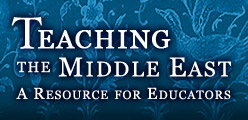Lesson Plans & Guiding Questions
LESSON 1
Colonial Legacy and Conflicts in the Middle East
The lesson addresses influences and impact of colonial powers. Students will begin to gain clarity into the real and perceived conflicts in the Muslim world, specifically the Middle East. Assigned reading material along with the teachers’ guidance students will learn and understand the economic and political motives of the European powers and the effects on the social, cultural and religious structure of Imperial Muslim World.
For Grade Level(s): 9–12
Time Needed: Six to eight class sessions
LESSON 2
A New Political Identity
General Description of Lesson Plan: This lesson will explore the concept of identity and the types of identities and their impact on individuals.
For Grade Level(s): 11–12
Time Needed: Five to seven class sessions



